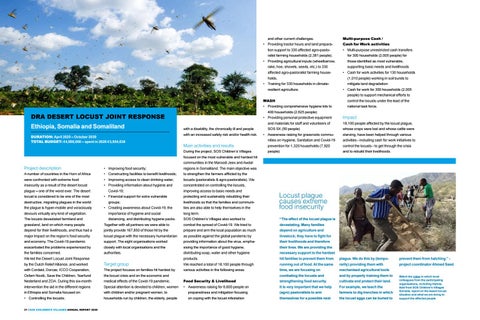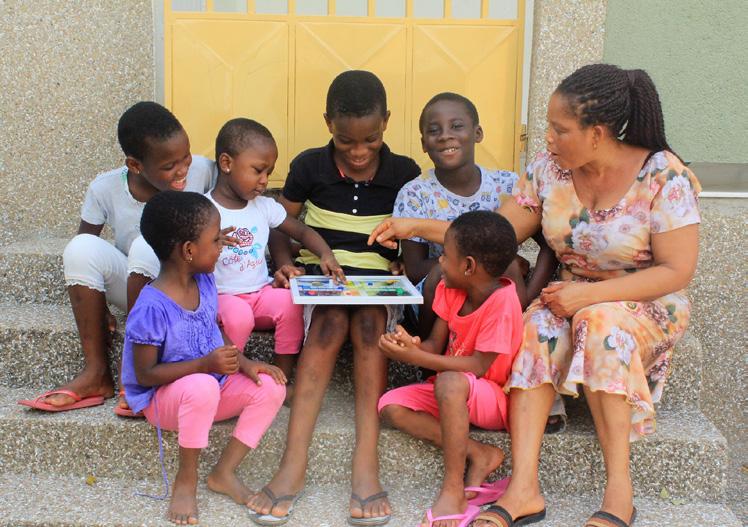and other current challenges. • Providing tractor hours and land preparation support to 330 affected agro-pastoralist farming households (2,381 people). • Providing agricultural inputs (wheelbarrow, rake, hoe, shovels, seeds, etc.) to 330 affected agro-pastoralist farming households.
Multi-purpose Cash / Cash for Work activities • Multi-purpose unrestricted cash transfers for 300 households (2,005 people) for those identified as most vulnerable, supporting basic needs and livelihoods • Cash for work activities for 130 households (1,010 people) working in soil bunds to
• Training for 330 households in climateresilient agriculture.
mitigate land degradation • Cash for work for 300 households (2,005 people) to support mechanical efforts to
DURATION: April 2020 – October 2020 TOTAL BUDGET: €4,000,000 – spent in 2020 €3,954,638
control the locusts under the lead of the
• Providing comprehensive hygiene kits to
national task force.
400 households (2,625 people)
DRA DESERT LOCUST JOINT RESPONSE Ethiopia, Somalia and Somaliland
WASH
• Providing personal protective equipment with a disability, the chronically ill and people with an increased safety risk and/or health risk.
Impact
and materials for staff and volunteers of
18,100 people affected by the locust plague,
SOS SX (50 people)
whose crops were lost and whose cattle were
• Awareness raising for grassroots commu-
starving, have been helped through various
nities on Hygiene, Sanitation and Covid-19
activities - including cash for work initiatives to
Main activities and results
prevention for 1,320 households (7,920
control the locusts - to get through the crisis
During the project, SOS Children’s Villages
people)
and to rebuild their livelihoods.
focused on the most vulnerable and hardest hit communities in the Maroodi Jeex and Awdal
Project description
• Improving food security;
regions in Somaliland. The main objective was
A number of countries in the Horn of Africa
• Constructing facilities to benefit livelihoods;
to strengthen the farmers afflicted by the
were confronted with extreme food
• Improving access to clean drinking water;
locusts (pastoralists & agro-pastoralists). We
insecurity as a result of the desert locust
• Providing information about hygiene and
concentrated on controlling the locusts,
plague – one of the worst ever. The desert locust is considered to be one of the most destructive, migrating plagues in the world: the plague is hyper-mobile and voraciously
Covid-19; • Financial support for extra vulnerable groups; • Creating awareness about Covid-19, the
improving access to basic needs and protecting and sustainably rebuilding their livelihoods so that the families and communities are also able to help themselves in the
Locust plague causes extreme food insecurity
devours virtually any kind of vegetation.
importance of hygiene and social
long term.
The locusts devastated farmland and
distancing, and distributing hygiene packs.
SOS Children’s Villages also worked to
“The effect of the locust plague is
grassland, land on which many people
Together with all partners we were able to
combat the spread of Covid-19. We tried to
devastating. Many families
depend for their livelihoods, and thus had a
jointly provide 167,850 of those hit by the
prepare and arm the local population as much
depend on agriculture and
major impact on the region’s food security
locust plague with the necessary humanitarian
as possible against the global pandemic by
livestock; they have to fight for
and economy. The Covid-19 pandemic
support. The eight organisations worked
providing information about the virus, empha-
their livelihoods and therefore
exacerbated the problems experienced by
closely with local organisations and the
sising the importance of good hygiene,
their lives. We are providing the
the families concerned.
authorities.
distributing soap, water and other hygiene
necessary support to the hardest
products.
hit families to prevent them from
plague. We do this by (tempo-
prevent them from hatching.” -
by the Dutch Relief Alliance, and worked
Target group
We reached a total of 18,100 people through
running out of food. At the same
rarily) providing them with
project coordinator Ahmed Saed.
with Cordaid, Dorcas, ICCO Cooperation,
The project focuses on families hit hardest by
various activities in the following areas.
time, we are focusing on
mechanised agricultural tools
Oxfam Novib, Save the Children, Tearfund
the locust crisis and on the economic and
combating the locusts and
and by properly training them to
Nederland and ZOA. During this six-month
medical effects of the Covid-19 pandemic.
Food Security & Livelihood
strengthening food security.
cultivate and protect their land.
intervention the aid in the different regions
Special attention is devoted to children, women
• Awareness raising for 6,600 people on
It is very important that we help
For example, we teach the
in Ethiopia and Somalia focused on:
with children and/or pregnant women, to
preparedness and mitigation focusing
(agro) pastoralists to arm
farmers to dig trenches in which
• Controlling the locusts;
households run by children, the elderly, people
on coping with the locust infestation
themselves for a possible next
the locust eggs can be buried to
We led the Desert Locust Joint Response
31 | SOS CHILDREN’S VILLAGES ANNUAL REPORT 2020
Watch the video in which local colleagues from the participating organisations, including Hamda Said from SOS Children’s Villages Somalia, report on the desert locust situation and what we are doing to support the affected people






















